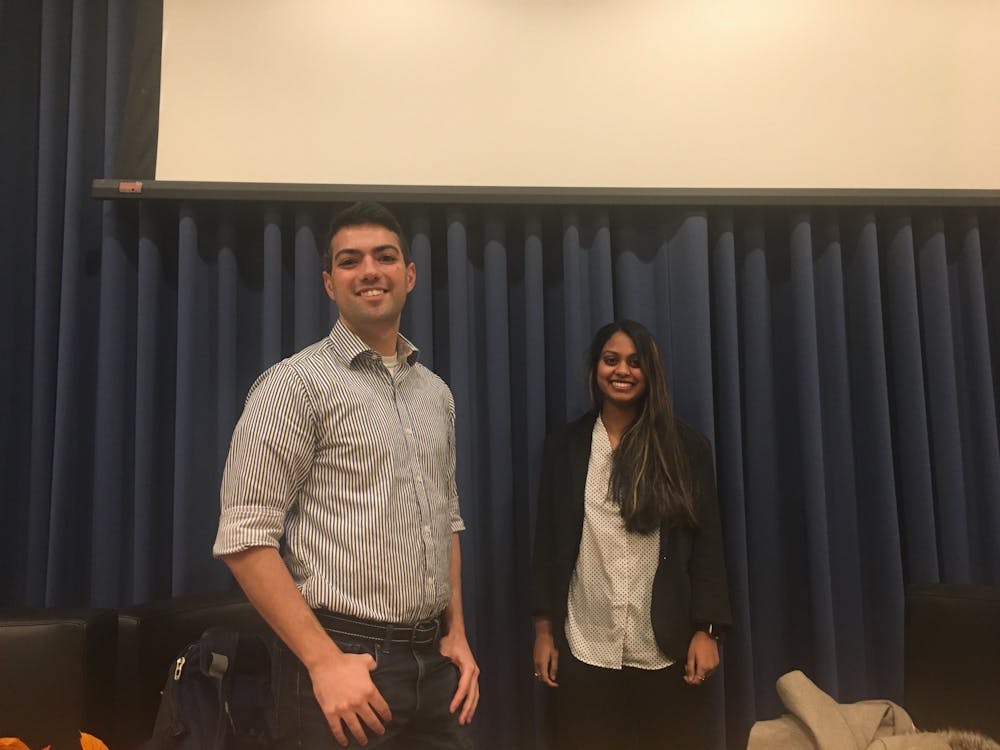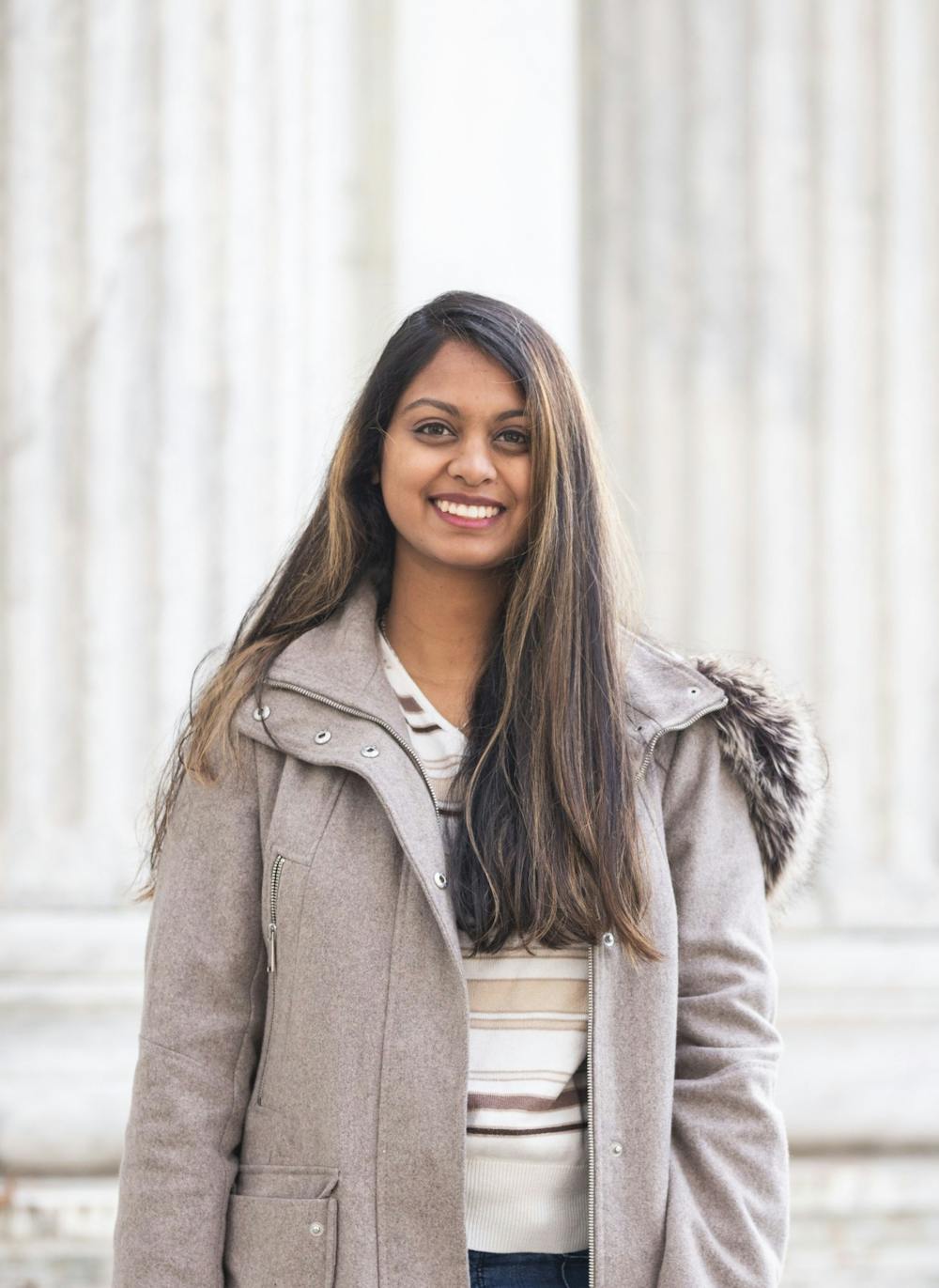Chitra Parikh ’21 is running against David Esterlit ’21 for Undergraduate Student Government (USG) president for the 2020 term. The Daily Princetonian sat down with her to discuss her candidacy, prior experience, and priorities to improve student life and wellbeing on campus. Below is a lightly edited and condensed transcript of the conversation.
Click here to read Esterlit's Q&A with the ‘Prince,’ and click here to read our coverage of last week’s USG presidential debate.
Daily Princetonian: Can you tell us a little bit about yourself: your hometown, your major, what you do on campus — whatever you think is relevant?
Chitra Parikh: My name is Chitra. I'm a junior; I study architecture; I'm from Hillsboro, New Jersey. On campus my main commitment is USG, so I am currently Vice President and I served as Executive Secretary the year before. Other than that I'm involved with a cultural dance group, Naacho, the South Asian dance company. And I’m also involved with the Pace Center and the Keller Center.
DP: If you could sum it up, why are you running for USG President?
CP: If I could sum it up in one sentence, it would be that I think, quite simply, USG can do more, and it should do more. To kind of elaborate on that, over the last few years I've worked with two different USG administrations, and I've kind of seen what the strengths of USG are and what the weaknesses of USG are. I've seen that USG can be an incredible force for good, whether it's through calendar reform, or making Kognito training mandatory for first years, or helping to start the satellite offices for CPS [Counseling and Psychological Services].
But there’s more that can be done and while those changes are great, we need to keep that momentum going and to keep building off of that to create more change. So, for me, that’s where my personal motivation comes from. I know how USG works, and I know that it can do something, so I want to lead a team and lead USG into doing something super meaningful.
DP: What is the biggest problem that you see on campus right now, and what is your plan to solve it?

CP: Yeah, so I think for me, one of the biggest problems I see on campus is just — I’m going to broadly categorize it as mental health, but generally like a lack of focus on student wellbeing. So I think that falls into a variety of different categories. I mentioned this during the debate, but mental health is important because it affects how we go about our daily lives and how we can interact with this campus in our communities.
I have a few ideas for some CPS-related policies, the first being finding transportation to see off-campus providers so that students have even more resources available to them, and partnering with CPS to create ... a question-answer form, where students can ask questions about policies they need clarification on.
But beyond that, I think it’s also, just for me, what improving student wellbeing looks like and improving mental health looks like, is a lot about accessibility. So, how can we make information readily available, how can we make resources available, how can we take the resources on campus and enhance them to make sure that everyone has equal access to them?

Candidates David Esterlit ’21 and Chitra Parikh ’21 pose following the USG presidential debate.
Photo Credit: Evelyn Doskoch / The Daily Princetonian

DP: What role do you think that past experience plays in this kind of election, and how do you think that your personal experiences, whether inside or outside of USG, qualify you for this job?
CP: Yeah, absolutely. So I think there’s two parts of this. The first is that the USG president is leading a team of 23 voting members and a team of over 100 people on committees, subcommittees, ad hoc committees, various aspects of USG.
And so part of that is, experience helps you because you’ve seen kind of the procedures and policies in place. So, to give you an example, right: I’ve been going to USG Senate meetings on Sunday nights for the last two years. So, I’ve seen kind of what the process for running that meeting looks like. I’ve seen how the agenda is made. I’ve seen how the packet is sent out. But beyond that, there’s also, the experience plays a role, because the USG President has a lot of different responsibilities that are sometimes hard to learn in the moment.
So for instance, the USG president presents to the Board of Trustees. And that’s an extremely important presentation, because the Board of Trustees makes many, many decisions regarding campus life. And so having that experience for instance helps me understand how to best, you know, present student opinions, present student feedback, and use that as a force for change.
Beyond that, though, leadership comes with experience. And so, talking about experience, not just with USG, but also, I’ve been on the board of my dance company, and I am a leader at the Pace Center. I think all of those experiences have taught me how to work with different types of people, and how the most productive way of working is not the same for everyone. I recognize and acknowledge that, and I think for me, that’s something that’s very central to my leadership philosophy.
DP: Now, moving on to the issue of student apathy. Lack of engagement with USG has been an issue in recent years. So if elected, what will you do to promote renewed interest in student government?
CP: Yeah, so I have a few ideas of tackling this. I think the first one is just simply reaching out, right? So I think USG can do a lot more of getting feedback from students in ways that aren’t just, oh, let’s fill out another survey again, right? We can host focus groups, we can talk to students. So I think that’s the first part of it. I think the second part of it is that, for me personally, I would like to see USG engage with campus groups that perhaps they haven't engaged with in the past, and make a more diligent effort to reach out to communities, beyond what we already identify with.
So yeah, I think the focus groups, I think getting feedback, I think creating opportunities for people to speak their opinion and for them to feel like they are being heard. That’s what’s really important to me. I think beyond that, though, generally the way we restore trust in USG is by USG doing something, right? So, that’s also part of it, is, you know, creating these successful changes and policies that you implement, that I think also can help with restoring trust.
DP: What do you think sets you apart from your opponent?
CP: So, I think for me, personally, what I believe sets me apart from my opponent is two things. The first is that I have the experience necessary to just jump into this position right from day one and start leading with a focus on the issues rather than having to spend a few weeks or months learning about, kind of, what the role entails, how every single position in USG works, and what their role is in creating these policy changes and implementing these ideas.
I think the second thing that sets me apart is I have a clear list of priorities that I believe USG should focus on. I have a vision for how that’s going to happen.
Beyond that, I’ve already spoken to a variety of different individuals when I was crafting my platform, so for instance, Dr. Calvin Chin has expressed interest — he’s the Director of CPS — he’s expressed interest in the questionnaire reform. I’ve spoken to various students, while I was creating my platform, and I’ve gotten feedback from over 10 students. So, I believe that’s what sets me apart, is that I have the experience and I have a vision for how I want USG to work and what I want USG to do. Beyond that, USG is something I already commit so much of my time to, and I’m willing and ready to commit even more, if I’m elected. So for me, I bring that commitment and dedication with the experience in the position.
DP: And then finally, in the spirit of positivity, what do you respect or admire most about your opponent, or their platform?
CP: I respect that David has made a very diligent effort to reach out to students. I’ve seen him interact with so many different people all over campus, and so that’s something that I really respect about him. I also respect that he is taking the initiative to, you know, start these conversations.








